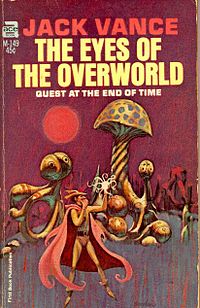- The Eyes of the Overworld
-
The Eyes of the Overworld 
cover of first edition of The Eyes of the OverworldAuthor(s) Jack Vance Country United States Language English Series Dying Earth series Genre(s) Fantasy novel Publisher Ace Books Publication date 1966 Media type Print (Paperback) ISBN NA Preceded by The Dying Earth Followed by Cugel's Saga The Eyes of the Overworld is a fantasy fixup by Jack Vance published in 1966, the second in the Dying Earth series. It features a series of linked stories detailing the travails of the self-proclaimed Cugel the Clever. In the Vance Integral Edition the book is retitled Cugel the Clever.
Plot summary
Cugel is easily persuaded by the merchant Fianosther to attempt the burglary of the manse of Iucounu the Laughing Magician. Trapped and caught, he agrees that in exchange for his freedom he will undertake the recovery of a small hemisphere of violet glass, an Eye of the Overworld, to match one already in the wizard's possession. A small sentient alien entity of barbs and hooks, named Firx, is attached to his liver to encourage his "unremitting loyalty, zeal and singleness of purpose," and Iucounu uses a spell to transport Cugel via flying demon to the remote Land of Cutz.
There, Cugel finds two villages, one occupied by wearers of the violet lenses, the other by peasants who work on behalf of the lens-wearers, in hopes of being promoted to their ranks. The lenses cause their wearers to see, not their squalid surroundings, but the Overworld, a vastly superior version of reality where a hut is a palace, gruel is a magnificent feast, etc. — "seeing the world through rose-colored glasses" on a grand scale. Cugel gains an Eye by trickery, and escapes from Cutz. He then undertakes an arduous trek back to Iucounu, cursing the magician the entire way; this forms the principal part of the book.
After many pitfalls, setbacks, and harrowing escapes, including the eviction of Firx from his system, Cugel returns to Iucounu's manse, where he finds the wizard's volition has been captured by a twin to Firx. Cugel manages to extirpate the alien, subdue the magician, and enjoy the easy life in the manse, until he tries to banish Iucounu and Fianosther (who himself has come to pilfer from Cugel) with the same spell that the magician had used on him. But Cugel's tongue slips in uttering the incantation, and the flying demon seizes him instead, delivering him to the same spot as before.
Author Michael Shea wrote an authorized sequel, A Quest for Simbilis (DAW Books, NY, 1974). Vance's own Cugel sequel was published as Cugel's Saga in 1983.
Cugel's character
Cugel is a classic Vance anti-hero; though he fancies himself an aesthete and a superior being to those around him, in his actions he is a liar, a cheat, an inveterate thief, a guiltless coward, a charlatan, selfish, greedy, vicious, and so on. With less obloquy, Vance describes him as "a man of many capabilities, with a disposition at once flexible and pertinacious. He was long of leg, deft of hand, light of finger, soft of tongue ... His darting eye, long inquisitive nose and droll mouth gave his somewhat lean and bony face an expression of vivacity, candor, and affability. He had known many vicissitudes, gaining therefrom a suppleness, a fine discretion, a mastery of both bravado and stealth."
Cugel often tries to take advantage of those around him, always complaining when they trick him back, curse him as he harms them, or expose his wiles. Almost as often, however, Cugel finds himself the victim of a trick himself; "the Clever" is to some degree an ironic title.
Cugel fancies himself a seducer of women, but his charms are apparent mainly to himself. His record is not good: he trades one, having lost her the rulership of a city, to bandits in exchange for safe passage; another he leaves to drown and does nothing to avert the destruction of her village; he causes the village of a third to be abandoned in dread.
It must be said that he treats men scarcely better. For example, he bribes a priest into tricking fifty pilgrims into a futile pilgrimage, to guard his crossing of a perilous desert - only fifteen survive. On the other hand, Cugel displays a genuine regard for the most selfless of the pilgrims, somewhat to his own surprise.
References
- Underwood, Tim; Chuck Miller (1980). Jack Vance. New York: Taplinger Publishing Company. p. 228. ISBN 0-8008-4295-2.
Dying Earth series Demon Princes series Planet of Adventure series Durdane series Alastor series Trullion: Alastor 2262 · Marune: Alastor 933 · Wyst: Alastor 1716Lyonesse series Suldrun's Garden · The Green Pearl · MadoucThe Cadwal Chronicles Araminta Station · Ecce and Old Earth · ThroyOther novels The Five Gold Bands · Vandals of the Void · To Live Forever · Big Planet · The Languages of Pao · Slaves of the Klau · Space Opera · The Houses of Iszm · The Blue World · Emphyrio · The Gray Prince · Showboat World · Maske: Thaery · Galactic Effectuator · Night Lamp · Ports of Call · LuruluShort stories/novellas "Telek" · "Gateway to Strangeness" · "The Dragon Masters" · "The Last Castle" · "The Moon Moth" · "Son of the Tree" · "Monsters in Orbit" · "The Brains of Earth" · "Rumfuddle" · "The New Prime" · "Men of the Twelve Books" · "Noise" · "Ullward's Retreat"Categories:- American fantasy novels
- 1966 novels
- Novels by Jack Vance
- Fantasy novels
- Dying Earth
- 1960s fantasy novels
Wikimedia Foundation. 2010.
